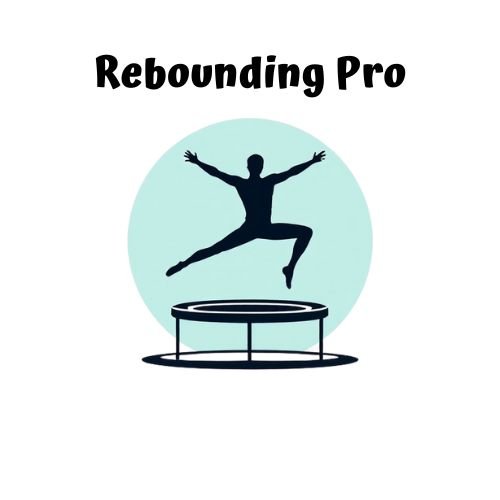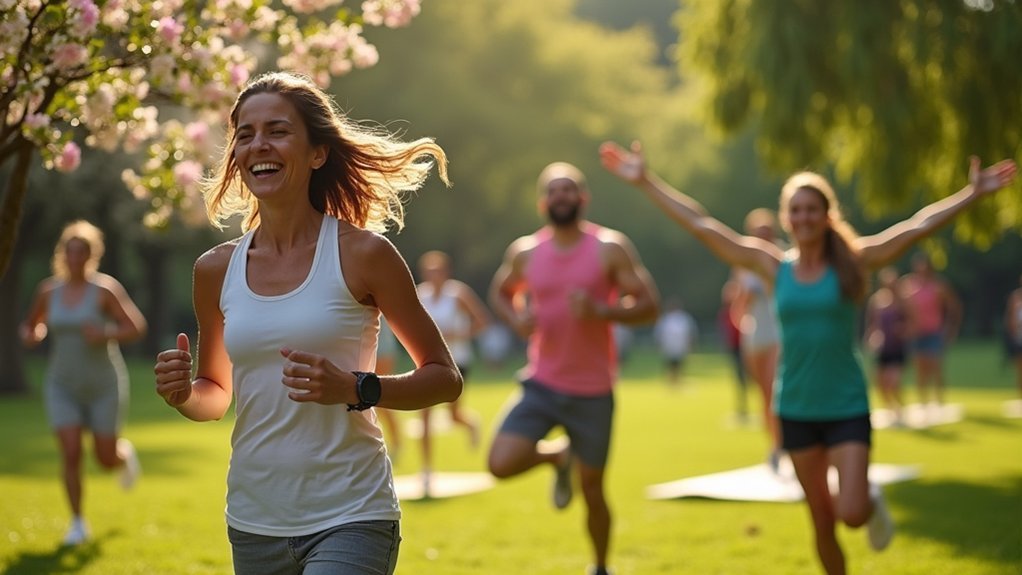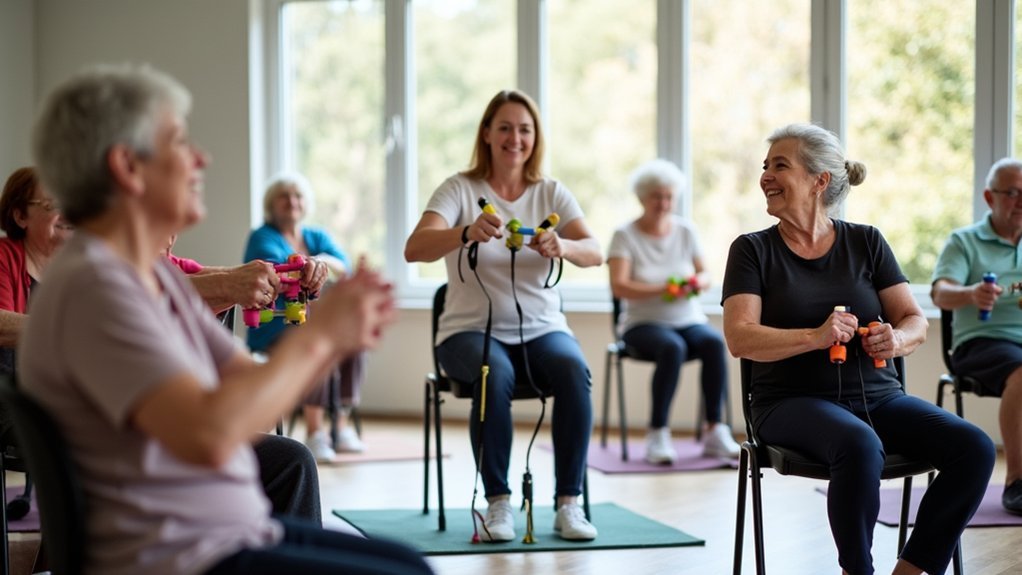Exercise triggers a rapid immune response within just 15 minutes of moderate activity like cycling or brisk walking. Your body immediately mobilizes natural killer (NK) cells—your first line of defense against infections and cancer. The 30-minute sweet spot optimizes immune benefits without overtaxing your system, while elevated body temperature during exercise helps inhibit bacterial growth. You don’t need intense workouts; moderate activity three times weekly can reduce cold risk by 26% and enhance vaccine effectiveness. The science behind this immune boost is fascinating.
The Science Behind Exercise and Immune Cell Mobilization

While many people exercise to build muscle or lose weight, the impact on your immune system may be even more significant.
Just 30 minutes of moderate cycling can trigger a remarkable immune response within 15 minutes, primarily through the mobilization of natural killer (NK) cells.
These specialized immune cells act as your body’s first line of defense, identifying and eliminating infected or cancerous cells without requiring previous exposure.
When you exercise, your circulation improves, allowing these immune cells to patrol your body more effectively.
The increased body temperature during exercise creates an additional protective effect by inhibiting bacterial growth and enhancing immune cell function.
Regular exercise maintains this protective cycle, ensuring your immune system consistently regenerates and deploys its cellular defenders to keep you healthy.
How NK Cells Respond to Just 15 Minutes of Movement
The rapid immune response from exercise is more immediate than most people realize. In just 15 minutes of moderate intensity exercise, your body considerably increases its NK cell levels, as demonstrated in a study where 10 volunteers showed marked increases after brief cycling sessions.
These natural killer cells are essential for your immune defense, quickly identifying and destroying infected or cancerous cells throughout your body.
What’s particularly remarkable is that researchers found no additional NK cell increase after 30 minutes, suggesting you don’t need lengthy workouts to boost your immune system.
This discovery has significant implications, especially for cancer patients and others seeking to enhance their immune function. Even short, moderate exercise sessions can effectively mobilize these critical immune cells.
What Happens in Your Body During a Quick Workout

When you engage in a quick workout, your body launches an impressive cascade of immune-boosting activities. Within just 15 minutes, your natural killer cells mobilize and begin circulating more efficiently throughout your system, ready to identify and eliminate threats like infected or cancerous cells.
As you exercise, your white blood cells move more strategically through your bloodstream, enhancing your body’s surveillance system. Your slightly elevated body temperature creates an environment that makes it harder for bacteria to thrive, while improved oxygen exchange in your cells strengthens your overall immune response.
Meanwhile, your brain releases mood-boosting endorphins that simultaneously lower stress hormones—a double benefit since chronic stress can suppress immune function.
This immune enhancement occurs even during moderate 30-minute sessions, making exercise a powerful daily defense.
Moderate vs. High-Intensity Exercise: Which Boosts Immunity Better?
Not all exercise affects your immune system equally. Moderate exercise delivers superior immune benefits compared to high-intensity workouts. Just 15 minutes of brisk walking or slow cycling considerably increases your natural killer cell levels, enhancing your immune function.
While high-intensity exercise improves cardiovascular fitness, it can elevate stress hormones and potentially weaken immunity when performed longer than 90 minutes. You’ll know you’re in the moderate zone when you can still maintain a conversation during your workout.
High-intensity workouts benefit your heart but may compromise immunity when overdone. Aim for the talk test—if you can converse, you’re in the moderate sweet spot.
People who engage in moderate exercise three times weekly are 26% less likely to catch colds. This level of activity optimizes white blood cell circulation without overwhelming your system.
It also improves vaccine efficacy by enhancing antibody responses—particularly valuable if you can’t sustain high-intensity routines.
The Role of Exercise Duration in Immune Function

Finding the ideal exercise duration for immune benefits doesn’t require hours at the gym. Just 15 minutes of moderate activity triggers a significant increase in natural killer cells—your body’s defense against infections and cancerous cells.
After 30 minutes, these NK cell levels stabilize, suggesting that brief workouts effectively mobilize your immune system.
If you’re short on time, you’ll be relieved to know that daily exercise in small doses still contributes to strengthening the immune system. Research shows that people who exercise just three days weekly have 26% fewer upper respiratory infections.
This makes short workouts particularly valuable for busy individuals and those with health vulnerabilities like cancer patients. Even half an hour of movement can enhance your immune response and deliver substantial health protection.
Walking Your Way to Stronger Immunity
Although many people associate immune-boosting exercise with intense workouts, a simple daily walk offers remarkable protection against illness. Just 30 minutes a day of brisk walking can greatly reduce your risk of chronic conditions and decrease your chances of developing respiratory symptoms like coughs and colds.
Walking enhances your body’s immune system by improving the circulation of white blood cells, which are essential for fighting infections. Research shows adults who exercise at least three days weekly are 26% less likely to catch colds.
For maximum health benefits, aim to walk at a pace of 4 to 6.5 km/h for 30 to 45 minutes, five times weekly. This routine helps regenerate immune cells and better prepares your body to fight pathogens, while releasing mood-boosting endorphins that reduce immunity-suppressing stress.
Practical Ways to Incorporate 30-Minute Exercise Sessions
While many people struggle to find time for exercise, integrating 30-minute activity sessions into your daily routine doesn’t require drastic lifestyle changes.
Finding time for 30-minute workouts is simpler than you think—no major lifestyle overhaul required.
These brief workouts greatly enhance your immune function while supporting your mental health through consistent activity.
Try these simple approaches to fit exercise into your busy schedule:
- Transform your commute by walking part of the way or parking farther from your destination
- Join a walking or exercise group for accountability and social connection
- Explore beginner-friendly workout videos on YouTube that you can follow at home
- Break your 30-minute exercise into shorter intervals throughout the day if time is limited
Beyond NK Cells: Other Immune Benefits of Brief Exercise
Even though Natural Killer (NK) cells receive significant attention in exercise research, your body’s immune response to brief workouts extends far beyond these specialized defenders.
When you engage in just 30 minutes of moderate exercise, you’re stimulating the circulation of crucial immune components like T cells and B cells that strengthen your infection-fighting capabilities.
Your brief workout creates multiple health advantages: it decreases inflammation levels, enhances antibody production, and temporarily elevates your body temperature—creating an environment where bacteria struggle to thrive.
Perhaps most importantly, consistent exercise helps regulate cortisol and other stress hormones that can otherwise suppress immune function.
This means your regular 30-minute sessions aren’t just building muscle—they’re constructing a more robust immune system that protects you daily.
Exercise Timing and Its Impact on Immune Response
When you exercise can profoundly influence your immune response, with morning workouts potentially offering different NK cell mobilization patterns than evening sessions.
The duration of your workout matters too, as the research shows that just 15 minutes delivers substantial immune benefits without requiring longer 30-minute sessions for NK cell activation.
Your body’s recovery period after exercise is equally important, as these temporarily elevated immune cells work to strengthen your overall defense system during the post-workout phase.
Morning Vs Evening Effects
The timing of your workout can greatly influence your immune response. Research suggests morning exercise may offer unique immune benefits by increasing circulation of protective NK cells during hours when you’re most vulnerable to infection.
Additionally, early workouts can regulate cortisol for balanced immune function and reduce stress throughout your day.
Both morning and evening exercise can strengthen immunity, but consider these timing effects:
- Morning workouts enhance immune function that lasts throughout the day
- Evening exercise benefits immunity but may disrupt sleep if done too late
- Early physical activity often improves mood and energy, indirectly supporting immune health
- Your hormonal responses differ based on timing—morning exercise optimizes cortisol while evening workouts may boost recovery-promoting melatonin
Choose what fits your lifestyle for consistent adherence.
Workout Duration Matters
Beyond when you exercise, how long you work out greatly impacts your immune response. Research reveals your body mobilizes natural killer (NK) cells after just 15 minutes of moderate exercise, with ideal benefits reached at 30 minutes.
A study of 10 volunteers showed that moderate cycling for half an hour considerably increased NK cell counts, with no additional immune benefits observed beyond this timeframe.
| Duration | NK Cell Response | Immune Benefit |
|---|---|---|
| 15 minutes | Significant increase | Immediate defense boost |
| 30 minutes | Ideal increase | Maximum immune mobilization |
| Beyond 30 min | No additional increase | No extra immunity gained |
This means you don’t need lengthy workouts to strengthen your immune system. Even short, consistent exercise sessions can effectively enhance your body’s defense against infections when time is limited.
Recovery Period Significance
After completing a workout, your body enters a critical phase where immune benefits truly develop and solidify.
Research shows the recovery period plays a pivotal role in enhancing your immune function, particularly through NK cells mobilization.
Blood samples reveal that your immune system kicks into high gear immediately after exercise:
- NK cell levels peak within just 15 minutes post-exercise
- Your slightly elevated body temperature helps inhibit bacterial growth
- Increased circulation improves immune cell delivery throughout your body
- Proper hydration and nutrition sustain these immune benefits
You’ll maximize these immune-boosting effects by paying attention to what happens in the 30 minutes following your workout.
This recovery window isn’t just for muscle repair—it’s when your body optimizes its defense systems, making the post-exercise period as valuable as the workout itself.
Frequently Asked Questions
How Just 15 Minutes of Exercise Can Boost Your Immune System?
Just 15 minutes of moderate exercise like cycling increases your natural killer cell levels immediately. These NK cells target infected and cancerous cells, enhancing your body’s defense system without requiring longer workouts.
What Is the Minimum Minutes One Should Get to Receive the Benefits of Exercise?
You’ll see immune benefits with just 15 minutes of moderate exercise, but aim for 30 minutes daily to optimize your health. For extensive immunity support, you should complete 150 minutes weekly as recommended.
What Time Is Your Immune System the Strongest?
Your immune system is typically strongest during late morning to early afternoon. This natural peak coincides with your body’s circadian rhythms. You’ll have better immune responses during this time without any additional interventions.
Why Does My Body Adapt to Exercise so Quickly?
Your body adapts quickly to exercise because it immediately increases heart rate and circulation, mobilizes immune cells like NK cells, releases endorphins, and reduces stress hormones—all within minutes of starting physical activity.
In Summary
You don’t need marathon workouts to strengthen your immune system. Just 30 minutes of movement mobilizes your NK cells and other immune defenders, with benefits starting in as little as 15 minutes. Whether you’re walking, jogging, or doing high-intensity intervals, consistency matters more than intensity. By making these short sessions part of your routine, you’re investing in both immediate and long-term immune protection.





Leave a Reply